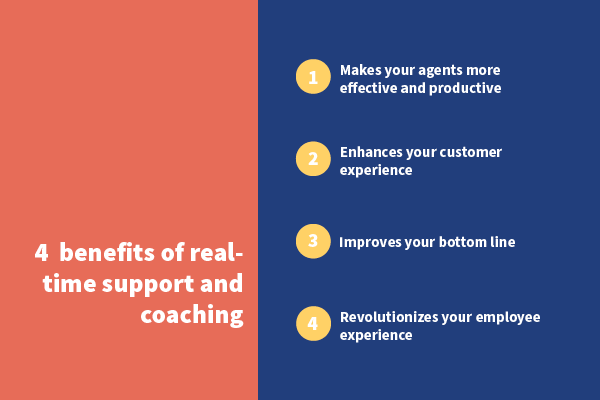Call agents are the face of your brand, representing your company to prospects and customers alike.
It’s crucial, therefore, that they perform to the best of their abilities. However, that’s becoming more difficult. According to McKinsey, 94% of senior customer-care executives “expected the skill demands placed on their contact center agents to increase over the next five years.”
So how can you effectively prepare them for the future? By providing real-time support and coaching on an ongoing basis.
If you get this right, the payoffs are enormous.
From a customer-facing perspective, you’ll improve your customer experience (CX), increase your conversion and retention rates, transform your customer lifetime value (CLV), and build long-lasting relationships based on genuine brand loyalty.
But that’s far from all. Internally, you’ll also:
- Improve your employee experience (EX);
- Empower agents to better serve customers;
- Demonstrating that you care about your employees’ long-term development;
- Significantly improve their job satisfaction.
Let’s examine the value of real-time support and coaching before sharing the unmissable tool that will help you provide this at scale to your team.
4 benefits of real-time support and coaching
Makes your agents more effective

Real-time support and coaching provide a myriad of profound — and wide-ranging — benefits to your organization. Most importantly, however, it’ll make your call agents better at what they do.
First, agents will be able to learn on the job. Learning by doing (aka active learning), where people learn by repeatedly doing the activity in question, is one of the most effective learning styles.
In fact, it’s been suggested that it’s particularly valuable for ‘Activists’—people who are generally quite extroverted and thrive on new experiences.
In other words, the sort of people who would likely choose to work in a customer-facing role.
On-the-spot training will help get agents up to speed more quickly than if they were left to figure it out for themselves.
From the employee’s perspective, they will no longer be left to flounder on their own when speaking to a tricky customer. They will instantly receive the support they need to better navigate tricky situations — such as managing an upset customer or dealing with a complex billing query on the go, instead of placing the caller on hold (which will negatively impact their CX).
They’ll be trained to move away from simply reciting scripts. Instead, they’ll learn how to practice active listening, constantly identifying the caller’s cues before responding appropriately.
From the employer's side, they can ensure that their agents are adequately trained by listening to their conversations with callers.
Managers will be able to spot poor practices that have snuck into an agent’s approach, such as asking prospects closed — instead of open — questions. They’ll be able to ensure that training is reinforced on an ongoing basis, instead of simply being a one-time-only, classroom-based process.
They’ll also be able to pick up on small areas that might be worth reexamining, like an agent’s tonality. Agents can follow your best practices to the letter, but if they do so with a monotonous drawl, this will poorly impact your customer’s experience.
Transforms your customer experience
Providing ongoing real-time support will have a profound impact on your CX. Given that 81% of marketers compete primarily on the basis of CX, it’s crucial that you get yours right.
Agents who have received real-time training will be taught how to better pinpoint and respond to a caller’s needs going forward. They’ll learn to quickly provide customers and prospects with appropriate solutions to their specific problem, getting to the heart of the problem before swiftly solving it.
Customers won’t have to repeat themselves or hang up in frustration due to a lack of progress. They’ll speak to sharp, positive, well-trained individuals who can effectively provide solutions to their individual problems, instead of making their way through a stale script — or having to put them on hold while they seek out more information/assistance.
Indeed, according to Software Advice, 69% of customers have stated that their CX improves when they speak to agents who don’t sound like they’re simply following a predetermined script.
Lead Center — a key part of CallRail’s all-encompassing platform — instantly provides reps with everything they need to know about each individual caller in an easy-to-use, intuitive dashboard. This means that it’s easier than ever before for agents to resolve issues swiftly.
What’s more, call monitoring allows managers to dive in and help as and when needed, providing crucial guidance and improving both your employees’ performance and your customer satisfaction.
Managers obviously won’t be able to support every single call as it takes place. However, by offering periodic real-time support, they’ll help positively impact how agents handle calls on their own going forward.
Improves your organization’s bottom line

Unsurprisingly, by empowering your call agents to provide a next-level CX, you’ll profoundly impact your organization’s bottom line.
CX can be the make or break factor when it comes to increasing your conversion rates. In fact, 74% of consumers state that they’re somewhat likely to buy based on experience alone.
So what does coaching have to do with this? According to McKinsey research, “... one retail bank found a direct correlation between the fraction of their time their service-to-sales team leaders spend on coaching and the conversion rates achieved by their teams”.
This is unsurprising. Practice alone doesn’t make perfect — only proper practice does. No matter whether a call agent has made 10 calls in their career or 10,000, it’s still important for managers to ensure that they’re following best practices.
But real-time coaching is about more than simply getting prospects over the line. CX also plays a crucial role in powering long-term customer loyalty. According to the Zendesk Brand Loyalty Survey, 40% of customers say that they’ll become loyal towards brands that exceed their customer service expectations. What’s more, 72% of respondents value customer service over price.
This is staggering. First, your organization will be able to retain more customers over the long term. With the cost of acquiring a new customer reported to be 5 - 25 times more than to maintain an existing one, and that existing customers are 50% more likely to try new products (spending 31% more than new customers), this long-term retention will have a profound ROI.
Second, you’ll actually be able to charge more for your products and services if you have a great CX. Not only will you be spending less on customer acquisition, but you’ll be receiving more for the products and services that you do sell.
In other words, it’s a win-win situation.
Improves your employee experience

The link between ongoing training and employee satisfaction is well documented. According to McKinsey, staff retention rates are twice the average amongst companies where call center coaches/managers regularly spend more than 60% of their time on the contact-center floor, coaching their agents.
When you consider the fact that the average call center agent turnover was over 40% last year in North America, and that it costs a reported $12,000 to recruit, onboard, and train a replacement, employee retention is crucial to ensuring that your organization is as profitable as possible.
But what does real-time coaching have to do with this?
For starters, you’ll demonstrate that you genuinely care about your employees. You want to invest time and energy into making them as effective as possible, teaching them crucial customer-facing skills that they can leverage throughout their careers..
Not only that, but you’re also willing to provide them one-to-one training. Mass, classroom-based learning is one thing — but giving up your time to sit in on one agent’s call is another matter entirely.
According to Gallup, providing ongoing support and training is key to avoiding employee burnout. Call center agents have tough jobs. It's not easy to provide a great CX when you spend all day on the phone with confused prospects or unhappy customers every single day.
Real-time support and coaching will teach agents how to better manage these stressful situations. It’ll provide a blueprint for successfully turning an unsatisfied caller into a grateful customer. Agents will be able to serve callers better, meaning callers will be more satisfied and treat the agents better.
Of course, you could argue that this applies to all training — regardless of whether it’s in real-time or not. True. However, real-time training is the most valuable of all. It’s easy to run through practice scenarios in a classroom far away from a caller’s frustrations. However, the trickiest part of the job is when you have an unhappy caller at the other end of the line.
By providing real-time support, you’ll show that you’re there for your employees when they need you the most.
The tools you need to provide first-class real-time training
It’s one thing knowing the value of real-time support — but how can you make this training as effective as possible? And which tools should you use?
Let’s examine these two areas in more detail.
Customer insights at your agents’ fingertips
Most callers have previously interacted with your company in some way, shape, or form. In order to serve their specific needs, it’s therefore crucial that agents can not only access these insights in a flash, but that they can also digest this information while holding a conversation.
Call Tracking will link every caller to the marketing materials they’ve already interacted with, revealing why they’re ringing your business in the first place. Lead Center then provides agents with a universal inbox where they can see each caller’s complete timeline to date and every piece of contextual information that your company has on this particular caller.
Train reps to synthesize this information in real-time before guiding the call appropriately. If you do, you’ll empower agents to swiftly resolve a customer or prospect’s issues — increasing their productivity while reducing response time, leading to happier customers.
Real-time call scoring
In busy call centers packed full of hundreds of agents, it’s hard for managers to spot who needs help and when. Conversation Intelligence, however, makes this process a breeze. Calls are instantly scored in real-time — meaning managers can instantly decipher which calls are (and more importantly, aren’t) going well.
Then, they can dive in and offer help where it’s needed the most.
We’re also busy developing Lead Center’s new service level metric, which will give managers a birds-eye view over how calls are going. They’ll be able to tell in real-time which calls are going well and which ones aren't — meaning they can dive in and offer their support when it’s most needed.
Support in secret
Relaying complex information in real-time is tricky. Your agents are simultaneously listening to the customer, thinking about how to respond, and trying to unpick whatever you’re frantically scribbling down on a whiteboard or pad of paper.
If only there were a way to speak to your agents without the customer hearing. Fortunately, with Lead Center, you can do just this. Listen to conversations as they take place. If you think an agent needs some support, simply offer real-time training via Whisper Monitoring that only your reps themselves can hear.
Real-time support for long-term gains
Real-time support and coaching will have a transformative impact on your organization. You’ll improve your CX, thereby increasing your conversion and retention rates, CLTV, and CPA. Agents will benefit from increased job satisfaction — reducing your staff turnover rate and improving their performance.
In order to achieve this, however, you need the right tools. With CallRail’s platform — Call Tracking, Conversation Intelligence, and Lead Center — you’ll make your real-time support as impactful as possible.
To find out more, book a 14-day free trial today.









